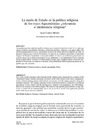Identificador persistente para citar o vincular este elemento:
https://accedacris.ulpgc.es/jspui/handle/10553/58978
| Campo DC | Valor | idioma |
|---|---|---|
| dc.contributor.author | Campos Méndez, Israel | en_US |
| dc.date.accessioned | 2019-12-17T14:54:48Z | - |
| dc.date.available | 2019-12-17T14:54:48Z | - |
| dc.date.issued | 2006 | en_US |
| dc.identifier.issn | 0213-0181 | en_US |
| dc.identifier.other | Dialnet | - |
| dc.identifier.other | WoS | - |
| dc.identifier.uri | https://accedacris.ulpgc.es/handle/10553/58978 | - |
| dc.description.abstract | Dos palabras podrían englobar la política religiosa que caracterizó al periodo de más de dos siglos que supuso el Imperio Aqueménida: tolerancia y utilización partidista. Dentro de lo que parece haber sido una línea programática, los reyes aqueménidas tuvieron una actitud inicial de aceptación de todas las prácticas religiosas que se fueron encontrando a lo largo de sus conquistas territoriales. El panorama religioso del Imperio Aqueménida se encuentra definido en torno a un politeísmo generalizado, en relación directa con el carácter heterogéneo de sus poblaciones y con independencia de la existencia de una religión oficial. La razón y el interés político ocupan, pues, un papel central a la hora de comprender las razones por las cuales no se actuó de forma contundente contra las prácticas rituales de los pueblos que eran sometidos. | en_US |
| dc.description.abstract | Two words would summarize what characterized the religious policy during the two centuries of the Achaemenid Empire: tolerance and party utilization. Inside what it seems to have been a programmatic line, Achaemenid kings had an initial attitude of acceptance of all the religious practices along their territorial conquests. The religious panorama of the Achaemenid Empire is defined by a polytheism generalized, in close relation with the heterogeneous character of its populations and with independence of the existence of an official religion. The reason of state and the political interest occupy, therefore, a central role for understanding why it was not acted of forceful form against the practical rituals of the towns that were submitted. | en_US |
| dc.language | spa | en_US |
| dc.relation.ispartof | Gerión | en_US |
| dc.source | Gerión [ISSN 0213-0181], v. 24 (1), p. 111-117, (2006) | en_US |
| dc.subject | 630703 Política social | en_US |
| dc.subject.other | Tolerancia religiosa | en_US |
| dc.subject.other | Dinastía aqueménida | en_US |
| dc.subject.other | Persia | en_US |
| dc.subject.other | Religious Tolerance | en_US |
| dc.subject.other | Achaemenid Dinasty | en_US |
| dc.subject.other | Ancient Persia | en_US |
| dc.title | La razón de Estado en la política religiosa de los reyes aqueménidas: ¿tolerancia o intolerancia religiosa? | en_US |
| dc.title.alternative | The Reason of State in the Religious Policy of the Achaemenid Kings: Religious Tolerance or Intolerance? | en_US |
| dc.type | info:eu-repo/semantics/article | en_US |
| dc.type | Article | en_US |
| dc.identifier.isi | 000421876700006 | - |
| dc.identifier.url | http://dialnet.unirioja.es/servlet/articulo?codigo=2053637 | - |
| dc.identifier.eissn | 1988-3080 | - |
| dc.description.lastpage | 117 | en_US |
| dc.identifier.issue | 1 | - |
| dc.description.firstpage | 111 | en_US |
| dc.relation.volume | 24 | en_US |
| dc.investigacion | Ciencias Sociales y Jurídicas | en_US |
| dc.type2 | Artículo | en_US |
| dc.contributor.daisngid | 11834697 | - |
| dc.contributor.authordialnetid | 896857 | - |
| dc.identifier.dialnet | 2053637ARTREV | - |
| dc.description.numberofpages | 7 | en_US |
| dc.utils.revision | Sí | en_US |
| dc.contributor.wosstandard | WOS:Campos Mendez, I | - |
| dc.date.coverdate | 2006 | en_US |
| dc.identifier.ulpgc | Sí | en_US |
| dc.contributor.buulpgc | BU-HUM | en_US |
| dc.description.esci | ESCI | |
| dc.description.erihplus | ERIH PLUS | |
| item.fulltext | Con texto completo | - |
| item.grantfulltext | open | - |
| crisitem.author.dept | GIR G9-Historia, economía y sociedad | - |
| crisitem.author.dept | Departamento de Ciencias Históricas | - |
| crisitem.author.orcid | 0000-0002-2768-7290 | - |
| crisitem.author.parentorg | Departamento de Ciencias Históricas | - |
| crisitem.author.fullName | Campos Méndez, Israel | - |
| Colección: | Artículos | |
Visitas 5
369
actualizado el 09-ene-2026
Descargas
94
actualizado el 09-ene-2026
Google ScholarTM
Verifica
Comparte
Exporta metadatos
Los elementos en ULPGC accedaCRIS están protegidos por derechos de autor con todos los derechos reservados, a menos que se indique lo contrario.
